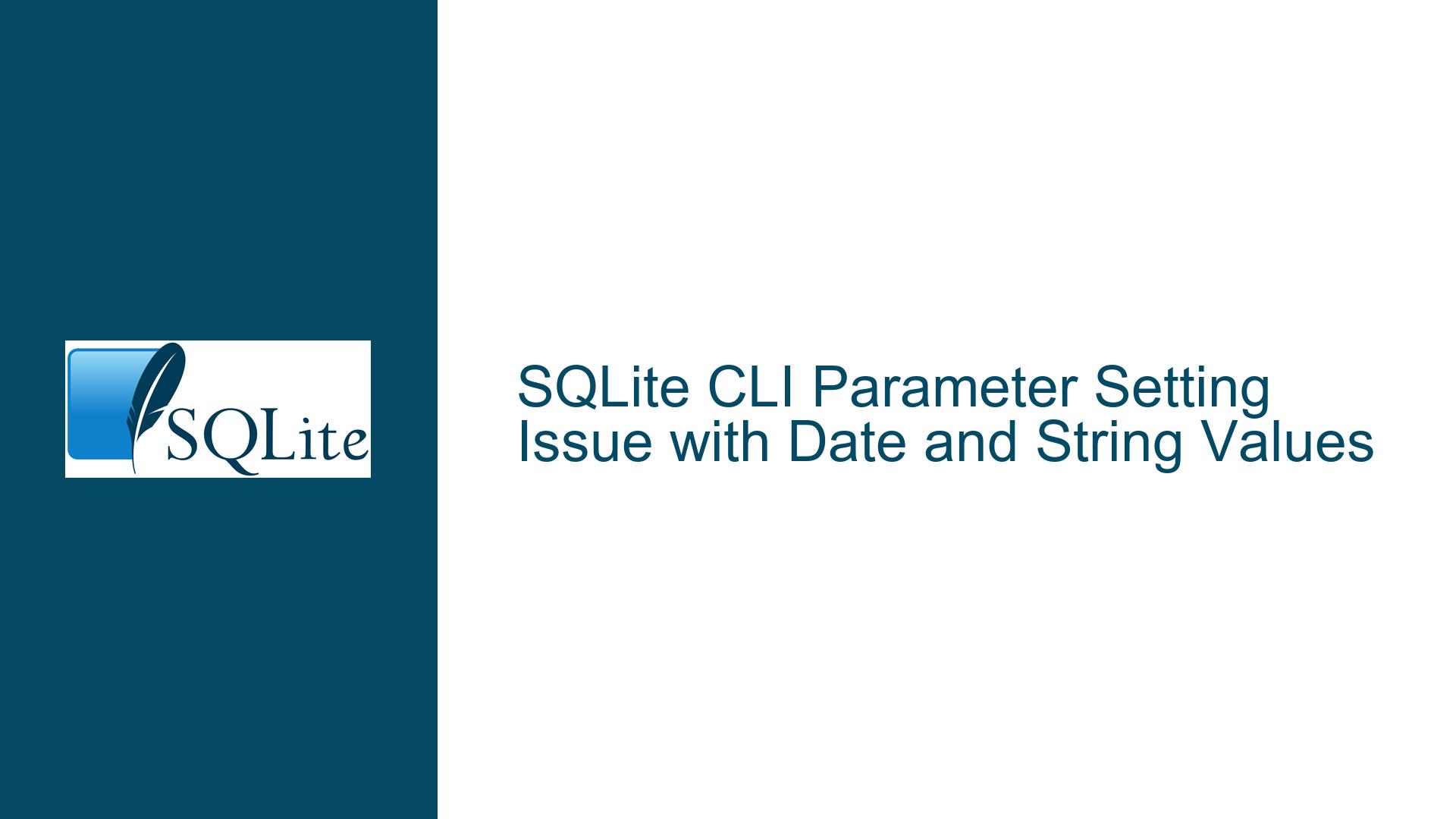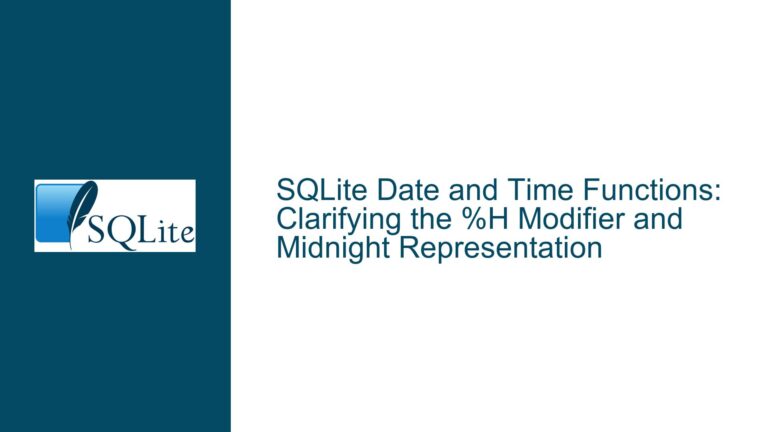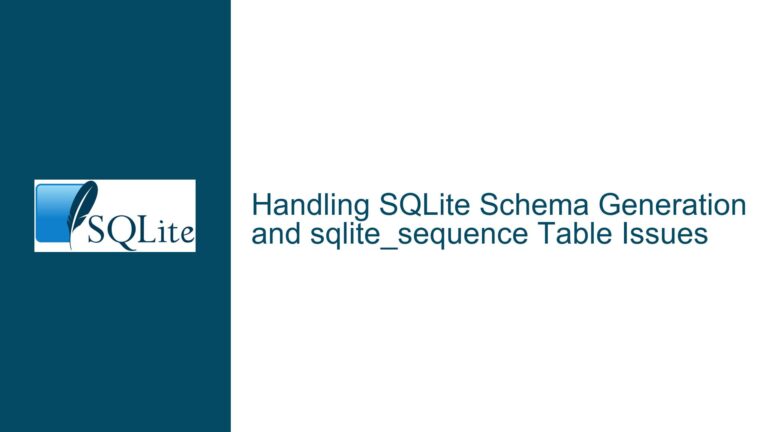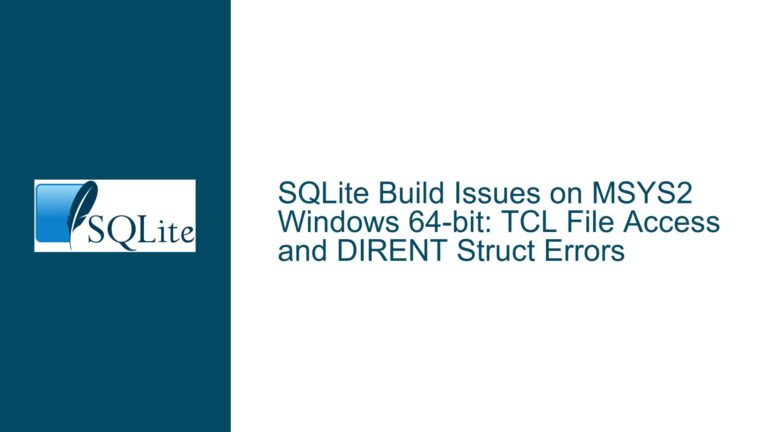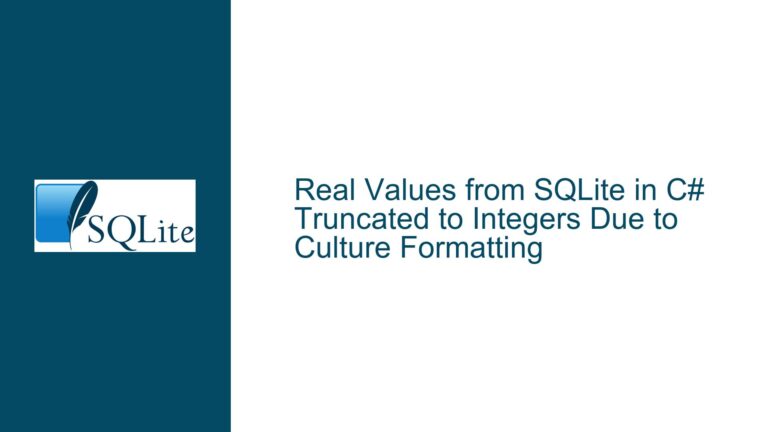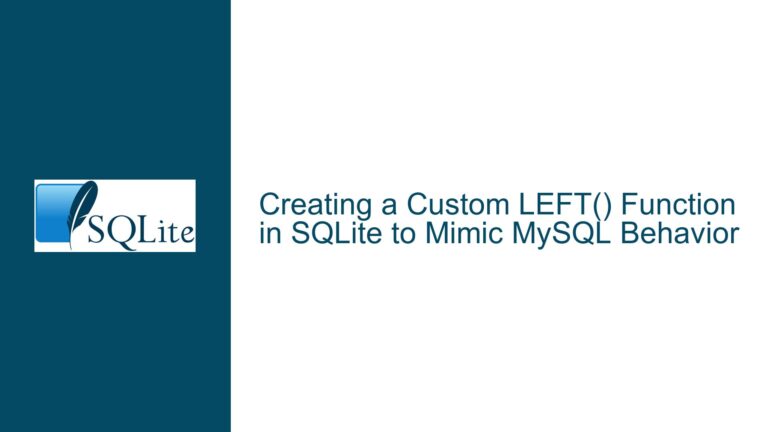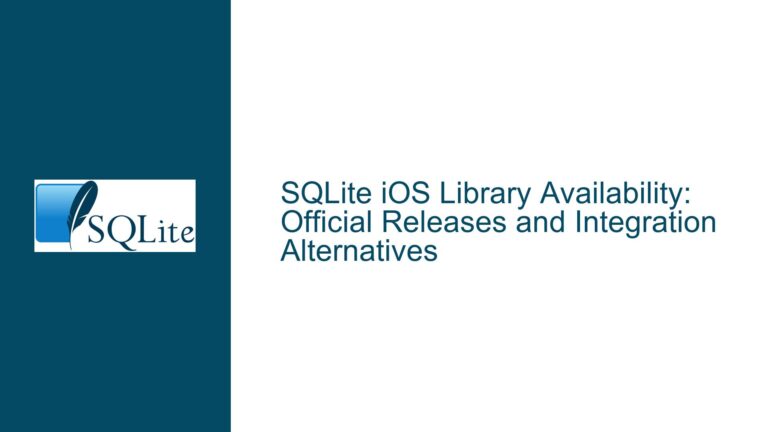SQLite CLI Parameter Setting Issue with Date and String Values
SQLite CLI Converts Date and String Parameters to Integers
When using the SQLite Command Line Interface (CLI), users may encounter an issue where date strings or other string values assigned to parameters are unexpectedly converted to integers. This behavior occurs when using the .param set command to assign values to parameters. For example, setting a parameter to a date string like '2021-03-01' results in the value being converted to 2017, which is clearly not the intended outcome. This issue stems from the underlying implementation of the sqlite_parameters table and its handling of data types.
The sqlite_parameters table is a temporary table used by the SQLite CLI to store parameter values. The table is defined with a value column of type ANY, which, according to SQLite’s type affinity rules, defaults to INTEGER affinity. This means that any value inserted into this column is implicitly converted to an integer if possible. This conversion is the root cause of the observed behavior, where date strings and other string values are misinterpreted as integers.
Type Affinity and Implicit Conversion in SQLite
SQLite uses a dynamic type system where the type of a value is associated with the value itself, not the column in which it is stored. However, columns have a type affinity that influences how values are stored and retrieved. The ANY type affinity, used in the sqlite_parameters table, allows any type of value to be stored but defaults to INTEGER affinity if no other type is specified. This leads to implicit conversion of values that can be interpreted as integers, such as numeric strings.
In the case of the .param set command, the value provided is first inserted into the sqlite_parameters table as-is. If this operation fails (e.g., due to type constraints), the CLI attempts to insert the value again, this time treating it as a string. However, because the value column has INTEGER affinity, the string is converted to an integer if it contains numeric characters. This explains why the date string '2021-03-01' is converted to 2017 and why the string '007' is converted to 7.
The issue is further complicated by the CLI’s handling of quoted arguments. When a value is enclosed in single or double quotes, the quotes are stripped before the value is processed. This means that even if a user explicitly quotes a string, the CLI may still interpret it as a number if it contains numeric characters. For example, .param set :x '007' results in the integer 7 being stored, while .param set :x "'007'" stores the string '007' because the outer quotes are stripped, leaving the inner quotes to be interpreted as part of the string.
Modifying SQLite CLI Behavior for Correct Parameter Handling
To address this issue, users can take several approaches depending on their specific needs and constraints. One solution is to modify the sqlite_parameters table to remove the ANY type affinity from the value column. This can be done by manually creating the table with a value column that has no specified type affinity, allowing it to store values without implicit conversion. The following SQL statement can be used to achieve this:
PRAGMA writable_schema = 1;
CREATE TABLE temp.sqlite_parameters(key TEXT PRIMARY KEY, value) WITHOUT ROWID;
PRAGMA writable_schema = 0;
This approach requires temporarily enabling the writable_schema pragma to modify the schema of the sqlite_parameters table. Note that this operation may also require disabling the defensive mode, which prevents modifications to internal schema objects. The following sequence of commands demonstrates how to perform this operation in the SQLite CLI:
.dbc onfig defensive off
PRAGMA writable_schema = 1;
CREATE TABLE temp.sqlite_parameters(key TEXT PRIMARY KEY, value) WITHOUT ROWID;
PRAGMA writable_schema = 0;
.dbconfig defensive on
Another solution is to patch the SQLite CLI source code to remove the ANY type affinity from the value column in the sqlite_parameters table. This involves modifying the shell.c.in file and rebuilding the CLI. The following patch can be applied to achieve this:
--- src/shell.c.in
+++ src/shell.c.in
@@ -2913,11 +2913,11 @@
sqlite3_db_config(p->db, SQLITE_DBCONFIG_WRITABLE_SCHEMA, -1, &wrSchema);
sqlite3_db_config(p->db, SQLITE_DBCONFIG_WRITABLE_SCHEMA, 1, 0);
sqlite3_exec(p->db,
"CREATE TABLE IF NOT EXISTS temp.sqlite_parameters(\n"
" key TEXT PRIMARY KEY,\n"
- " value ANY\n"
+ " value\n"
") WITHOUT ROWID;",
0, 0, 0);
sqlite3_db_config(p->db, SQLITE_DBCONFIG_WRITABLE_SCHEMA, wrSchema, 0);
sqlite3_db_config(p->db, SQLITE_DBCONFIG_DEFENSIVE, defensiveMode, 0);
}
This patch removes the ANY type specification from the value column, allowing it to store values without implicit conversion. After applying the patch, the CLI must be rebuilt from the modified source code.
For users who prefer not to modify the SQLite CLI or its source code, a workaround is to use double quotes to enclose the parameter value, ensuring that the value is treated as a string. For example, the following command correctly stores the date string '2021-03-01' as a parameter:
.param set :date "'2021-03-01'"
This approach works because the outer quotes are stripped by the CLI, leaving the inner quotes to be interpreted as part of the string. However, this workaround may not be intuitive for all users and requires careful handling of quotes.
In summary, the issue of SQLite CLI converting date and string parameters to integers is caused by the ANY type affinity of the value column in the sqlite_parameters table. This behavior can be addressed by modifying the table schema, patching the CLI source code, or using a quoting workaround. Each of these solutions has its own trade-offs and should be chosen based on the user’s specific requirements and constraints.
